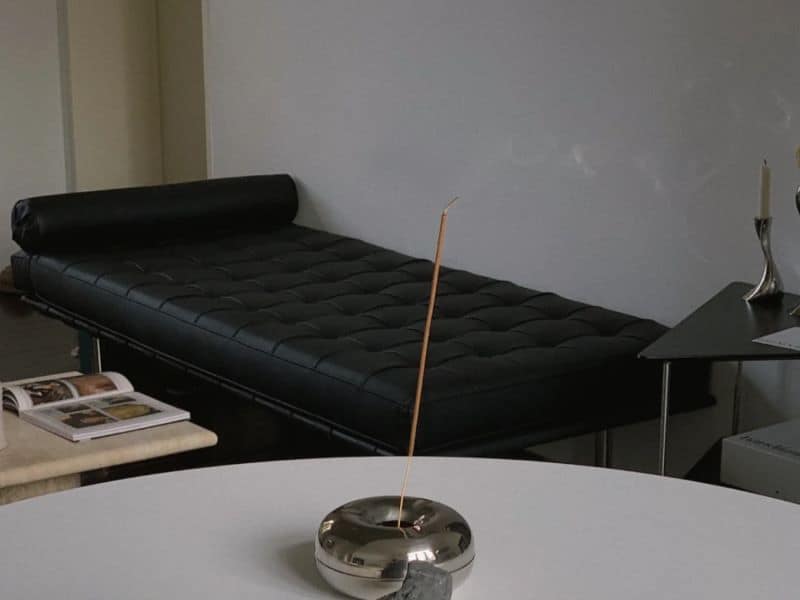Burning incense can be a healing way to add fragrance to your home. But if you live in an apartment, there’s more to consider than delightful smells.
In some cases, there are state laws or city ordinances that prohibit smoking in multi-unit buildings. If not, landlords have the liberty to set specific rules within their property. You have to check your apartment lease for possible restrictions. But if incense burning is allowed in your apartment, another consideration is the effect the smoke might have on your neighbors.
Fortunately there are brands of incense that produce less smoke. There are also natural alternatives to burning incense that smell equally delightful. Don’t miss my tips on how to navigate incense burning while living in an apartment.

First Things First: Understand the Law
Before going further, the first thing you want to do is have an understanding of what is and isn’t permitted where you live.
Federal, State, & City Laws
In some states, smoking is banned in public housing apartments.This is often the case in dormitory apartments as well. For instance HUD’s smoke-free rule was adapted to include incense because “it is a burning material, and it leaves a residue”
There are also counties that offer landlords assistance with forming a smoke-free policy for their multi-unit property.
Of course this varies by country, state, and city, so you will have to refer to your lease and have a conversation with your landlord to be certain.
What If I Live In a Smoke-Free Apartment Building?
Most smoke-free building laws refer to keeping indoor air clean from the “act of smoking.” This can include smoking cigarettes, cigars, a pipe or other smoking mechanism that requires inhaling and exhaling a substance.
Even more specifically this restriction refers to common areas of the building where you may come in contact with other residents outside of your apartment. But either way, the term does not usually apply to incense. Burning plant-based incense in your apartment unit is unlikely to be a violation of your lease, but in a smoke-free building there’s a fine line.
It really depends on what’s defined as “smoking.” A landlord can logically argue that lighting incense produces smoke and is therefore smoking.
So you have to read your lease and talk to your landlord about incense specifically. If there is a stipulation in your lease, and you choose to burn incense anyway, you will be in violation.
You also have to consider your neighbors.
Moving into a smoke-free apartment building suggests that they do not want to have any contact with any kind of smoke. Some people have health conditions that are irritated by smoke that incense produces, and they have the right to be protected from it. People with respiratory conditions like asthma, and chronic obstructive pulmonary disease (COPD) can become gravely ill when exposed to secondhand smoke.
Thirdhand smoke, which is the residue left behind on surfaces by smoke, is an increasing concern and can be most harmful to children.
Takeaway: Read your lease to find out if you’re prohibited from burning incense in an apartment located in a smoke-free building. Even if that stipulation isn’t there, burning incense might still be inconsiderate.
Does My Landlord Get to Control What I Do Inside My Apartment?
While landlords cannot control your every action while living inside a rental unit, they can take precautions to preserve the condition of the unit and building as a whole.
Whether you live in a smoke-free building or not, landlords have to look at the big picture.
Oftentimes they put rules in place to reduce the amount of resources necessary to prepare your apartment for the next tenant after you move out. If the walls are stained with smoke residue, that’s more labor and money they have to put into repairing property damage.
As one Florida attorney explained, “It’s a fair bet that burning incense in any rental is going to cause [an] issue as they tend to cause smoke damage and smell issues, much like smoking.”
Landlords also want to reduce liability. If tenants are harmed in a fire caused by unattended burning objects like candles or incense, I’m sure they’d feel bad about it, but at the same time, they’ll want to learn the source of the fire so as to avoid being held fully liable for leasees’ personal injury and property damages.
Takeaway: You might find your landlord’s rules to be annoying, but consider how much responsibility they have to keep you and others in your apartment building safe and housed.
What if My Landlord is Cool with It?
In some cases, landlords don’t mind if you burn incense or not, but there still might be other factors to consider.
You might enjoy the process of burning incense, but if you have a roommate, they might not share your enthusiasm. While there’s nothing wrong with burning incense in an apartment that doesn’t have any incense-burning restrictions, it helps to be considerate of others.
Some brands of incense release large amounts of smoke as they burn. Studies have shown that inhaling excessive amounts of incense smoke can lead to health problems similar to secondhand smoke produced by cigarettes.
I can’t imagine that you’d burn that much incense at once, but it’s just a matter of being mindful that those who live with you might not want to share your incense-burning experience.
We all have different scent preferences as well. If you have a roommate that strongly dislikes a particular scent, it might be helpful to burn that scent when they’re not at home.
Tips for Burning Incense in an Apartment
All other things considered, if you decide to go forward and burn incense in your apartment, there are safe and considerate ways to go about doing it.
Safely Light Incense
The most important thing you can do for yourself, roommates, and neighbors is to safely engage in incense burning. Smoldering incense should never be left unattended. When lighting it, do so away from hanging window treatments or anything else that can catch fire.
Always place your incense holder on a fireproof surface.
Also make sure that the ashes drop onto your fireproof holder. If the incense stick is hanging over the edge and ashes fall onto your carpet, that could create carpet burns, or spark a fire.
Burn Low Smoke Incense
Incense like HEM and Satya are notoriously smokey. Their wooden core leaves a heavier presence of smoke behind once they’ve stopped burning.
Choosing incense like Nippon Kodo or Shoyeido means that only the natural matter gets burned, less smoke is produced, and what’s left lingering in the air is more fragrance than smoke.
Choose Less Offensive Scents
If you live in close quarters or you know that your incense smoke creeps through the vents and into neighbors’ apartment units, consider burning more universal fragrances.
Lavender, vanilla, even some sandalwood blends can be more tolerable to others than, say, Nag Champa.
Morningstar is a good option. When I light these sticks, those around me who usually dislike the smell of incense, don’t even notice that I’m burning it so long as I keep my door closed.
Premium incense usually has even purer fragrance elements that gracefully release very low amounts of smoke and you smell far more fragrance.
You can’t go wrong when choosing incense made with natural ingredients.
Consider Diffusing Essential Oils
Some people who burn incense are drawn to the idea of natural botanical elements being released into the air. If this is the case for you, and you want to avoid the hassle of burning incense in an apartment, then consider essential oils.
Some of the best diffusers are the ones that don’t use water or heat. Diffusing essential oils gives you all the benefits of natural elements without any smoke.
In Conclusion
Whether or not you can burn incense in your apartment largely depends on whether there is a state or local law in place restricting this practice.
If not, there might be a clause in your apartment lease that prevents you from burning incense in your unit. You must read your lease and talk to your landlord before burning incense in your apartment.
Beyond that, you have to consider the extent to which your neighbors might be exposed to the smoke emitting from your incense. One way to avoid annoying roommates or neighbors is to burn low-smoke incense. Another alternative is to diffuse essential oils.
